Ever found yourself hesitating to ask a guest to remove their shoes, only to be told by someone, like your mother-in-law, that you’re being discourteous? You’re not alone! It’s a surprisingly polarizing topic that touches on cleanliness, cultural customs, and hosting etiquette. So, is it really rude to request this, or is it simply a matter of personal preference?
Understanding the Cultural Context of Shoe Removal

One of the biggest factors shaping opinions on this issue is culture. In many Asian and Scandinavian households, removing shoes is not just polite—it’s a must. It’s seen as a sign of respect and a way to keep homes clean and sacred. On the other hand, many Western cultures don’t place as much emphasis on this practice. Guests often keep their shoes on indoors, and requesting otherwise might be considered unusual.
Does this mean you shouldn’t ask guests to remove their shoes if it’s part of your household tradition? Absolutely not! The key is recognizing that cultural norms differ. Being aware of these differences can help you approach the topic in a way that’s both respectful and confident.
Health and Hygiene: The Case for Bare Floors
If you’ve ever looked at the bottom of a pair of shoes after a long day, you already know they’re not exactly clean. Shoes can track in dirt, bacteria, and allergens that could easily spread around your home. For families with small kids crawling on the floor or those with allergies, maintaining a shoe-free home can be a lifesaver.
Think about it: would you want the same shoes that trudged through public bathrooms or muddy sidewalks to stomp across your living room carpet? Probably not. Explaining this perspective to your guests can make your request feel less like an arbitrary rule and more like a thoughtful choice for the health of everyone in the household.
Does Hosting Etiquette Really Say No to Shoe Removal?
Traditional hosting etiquette often emphasizes guest comfort, suggesting that making guests feel at home should be your top priority. But modern etiquette acknowledges that it’s equally important to respect the host’s rules. After all, it’s your home, and you’re entitled to set boundaries.
The trick is finding a balance. Yes, you want your guests to feel comfortable, but you also want to feel comfortable in your own space. Asking guests to remove their shoes doesn’t have to be a big deal—it’s all about how you frame the request. Approach it with kindness, and most guests will happily comply.
Managing Family Dynamics: When Your Mother-in-Law Disagrees
Let’s face it: family dynamics can complicate even the simplest decisions. If your mother-in-law insists that asking guests to remove their shoes is “rude,” it can feel like you’re caught in the middle. So, how do you handle this without creating tension?
Start by having a calm conversation. Explain why this practice matters to you—whether it’s about cleanliness, cultural tradition, or personal preference. Acknowledge her perspective, but make it clear that this is a decision you’ve made for your home. Compromise can help here; for example, you could consider allowing exceptions for certain guests or occasions while sticking to your rule in everyday situations.
How to Politely Ask Guests to Remove Their Shoes
So, how do you actually ask someone to take their shoes off without sounding rude or awkward? It’s all about tone and preparation. Here are a few tips:
- Set the Tone Beforehand: If possible, let guests know about your shoe-free policy before they arrive. A simple mention in an invitation—like, “Feel free to bring comfy socks; we’re a shoe-free household!”—can go a long way.
- Provide Comfort: Make the transition easier by offering a designated shoe rack by the door and providing clean slippers or cozy socks for guests who might feel uncomfortable going barefoot.
- Use Polite Language: When guests arrive, frame the request as a preference rather than a demand. For example, “We usually ask everyone to leave their shoes at the door to keep things clean. Thanks so much!”
When you approach the topic with thoughtfulness, most people will appreciate your effort and won’t think twice about slipping off their shoes.
Balancing Tradition and Modern Practices
Incorporating traditions while respecting modern hosting practices can be a delicate dance. Traditional etiquette might emphasize catering to guests’ every need, but modern hosting often focuses on mutual respect and consideration. Striking the right balance means blending these approaches.
For instance, if you’re hosting a formal dinner party and you know some guests might find shoe removal awkward, consider making an exception for that event. But during casual gatherings or day-to-day visits, stick to your shoe-free rule. Flexibility shows thoughtfulness while still honoring your personal boundaries.
When Compromise Isn’t an Option
What if you have guests who outright refuse to take their shoes off, or your mother-in-law insists on overriding your rule? In these cases, it’s essential to stand your ground politely but firmly. Your home is your sanctuary, and maintaining its cleanliness and comfort is your right.

If someone disagrees, remind them that this isn’t about being “rude” or “discourteous.” It’s about creating an environment that works for your household. Offering alternatives—like slippers for those who prefer not to go barefoot—can help smooth over any discomfort.
Conclusion: Creating a Home That Reflects Your Values
Ultimately, asking guests to remove their shoes isn’t rude—it’s a reflection of your values and preferences. Whether you’re motivated by cleanliness, cultural tradition, or personal comfort, it’s entirely reasonable to expect guests to respect your house rules. The key is clear, kind communication and a willingness to accommodate others’ needs whenever possible.
At the end of the day, successful hosting isn’t about rigid adherence to etiquette or sacrificing your boundaries. It’s about creating an environment where both you and your guests feel respected and at ease. So, go ahead—ask politely, offer slippers, and enjoy a clean, happy home that truly feels like your own.
Entitled Hotel Guest Mocked My Mom Who Works as a Maid, so She Taught Her Never to Mess with Housekeeping Again

Entitled Hotel Guest Mocked My Mom Who Works as a Maid, so She Taught Her Never to Mess with Housekeeping Again
When a devoted hotel maid is tormented by a wealthy and arrogant guest, she devises a plan that turns the tables in the most unexpected way. Instead of seeking revenge with anger, she orchestrates a quiet but powerful act of defiance that forces the cruel woman to face the bitter consequences of her actions.
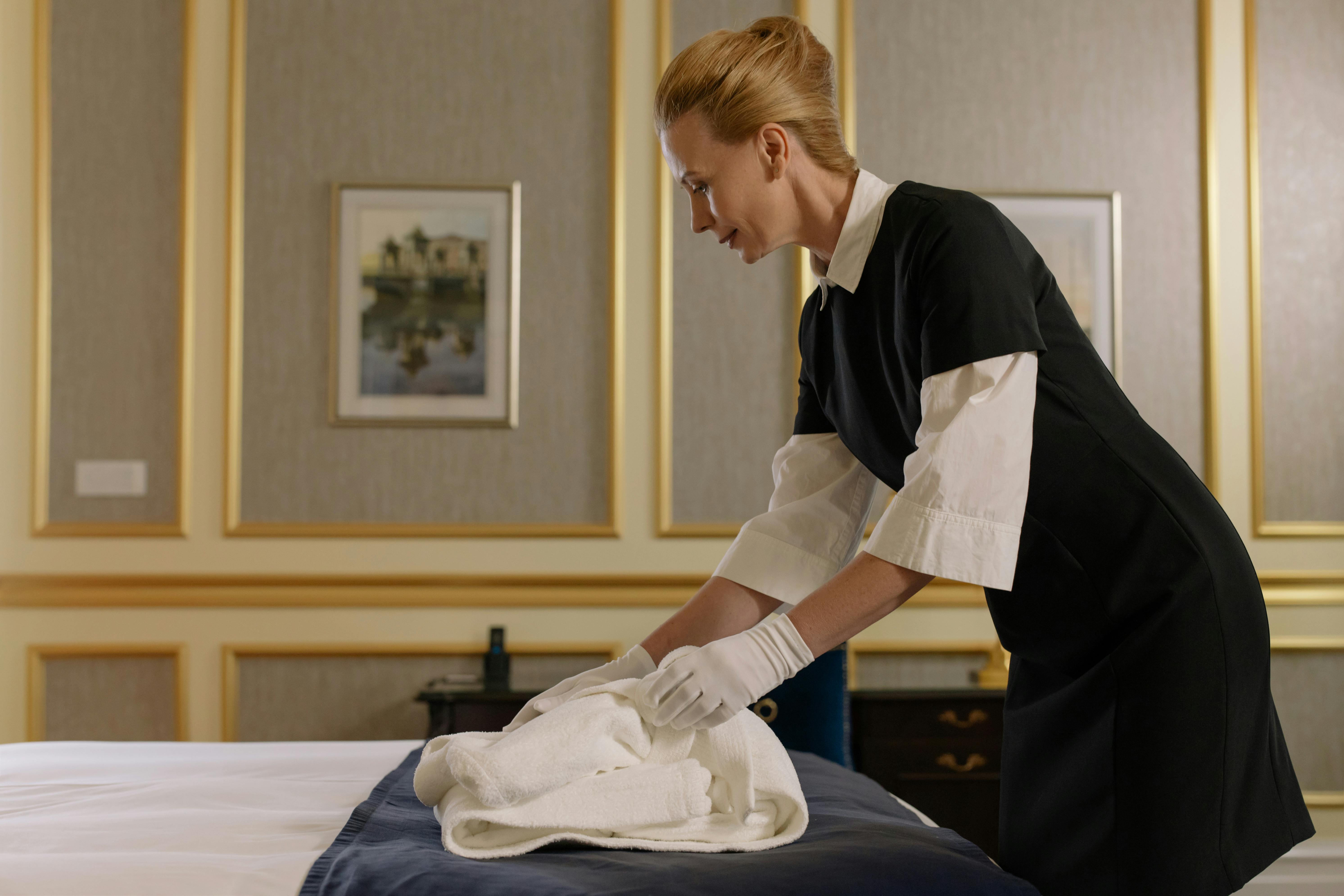
Woman cleaning a hotel room | Source: Pexels
My mother has always been a source of inspiration for me. As a maid at a fancy local hotel, she takes immense pride in her work. She treats every room as if it were her own, ensuring everything is spotless and welcoming for the guests.
Recently, however, she had an encounter that tested her patience like never before. It all started on a seemingly ordinary day. My mother was assigned to clean room 256, which was occupied by a young woman named Ms. Johnson.
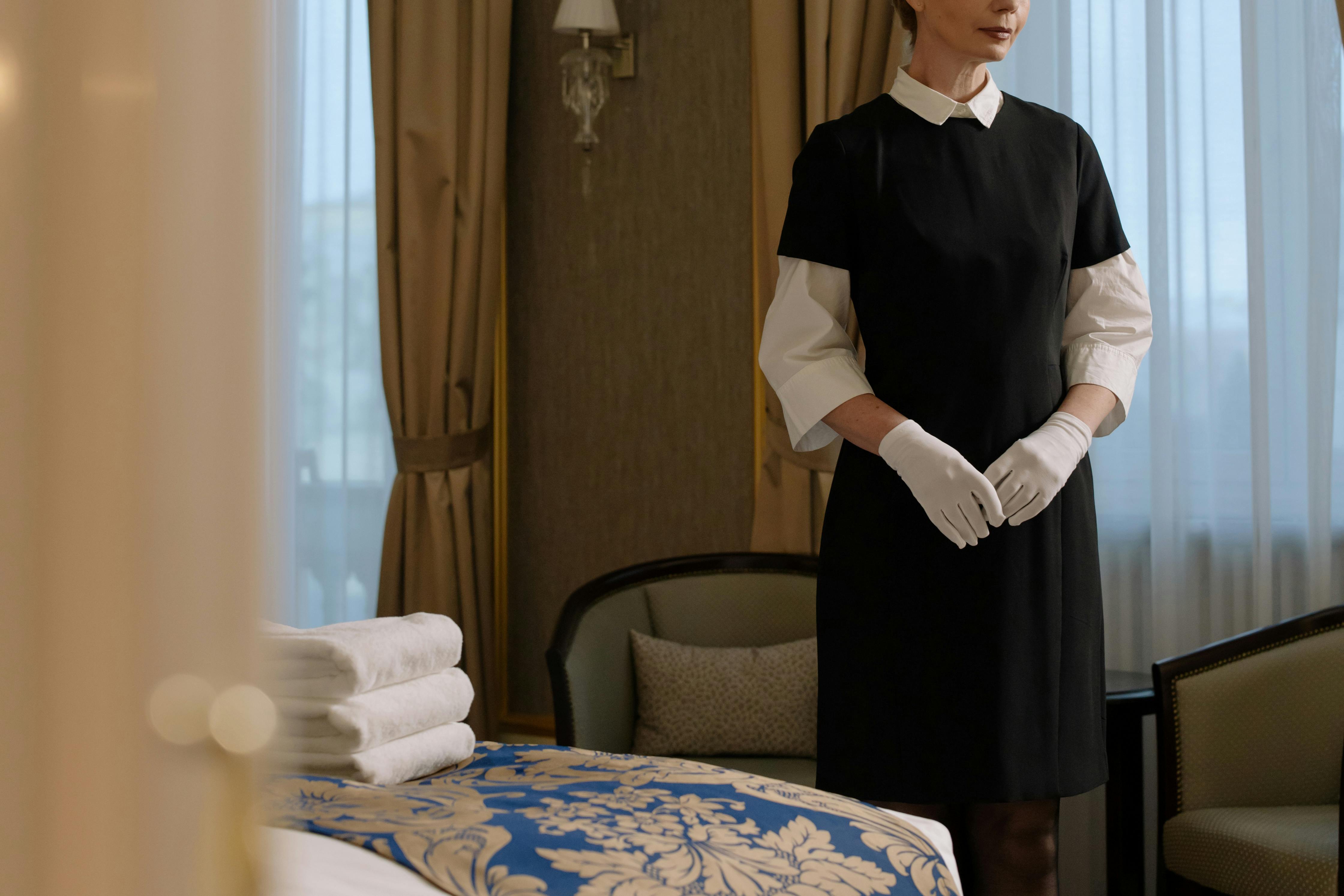
Woman in uniform beside hotel room bed | Source: Pexels
From the moment she stepped into the room, my mother could sense the woman’s dislike for her. Ms. Johnson lounged on the bed, scrolling through her phone, barely acknowledging my mother’s presence.
As my mother meticulously cleaned the room, making sure every surface was spotless, Ms. Johnson suddenly knocked her coffee cup off the table, sending dark liquid spilling onto the freshly mopped floor. She didn’t even flinch. Instead, she looked my mother straight in the eye and sneered, “Clean that up!”
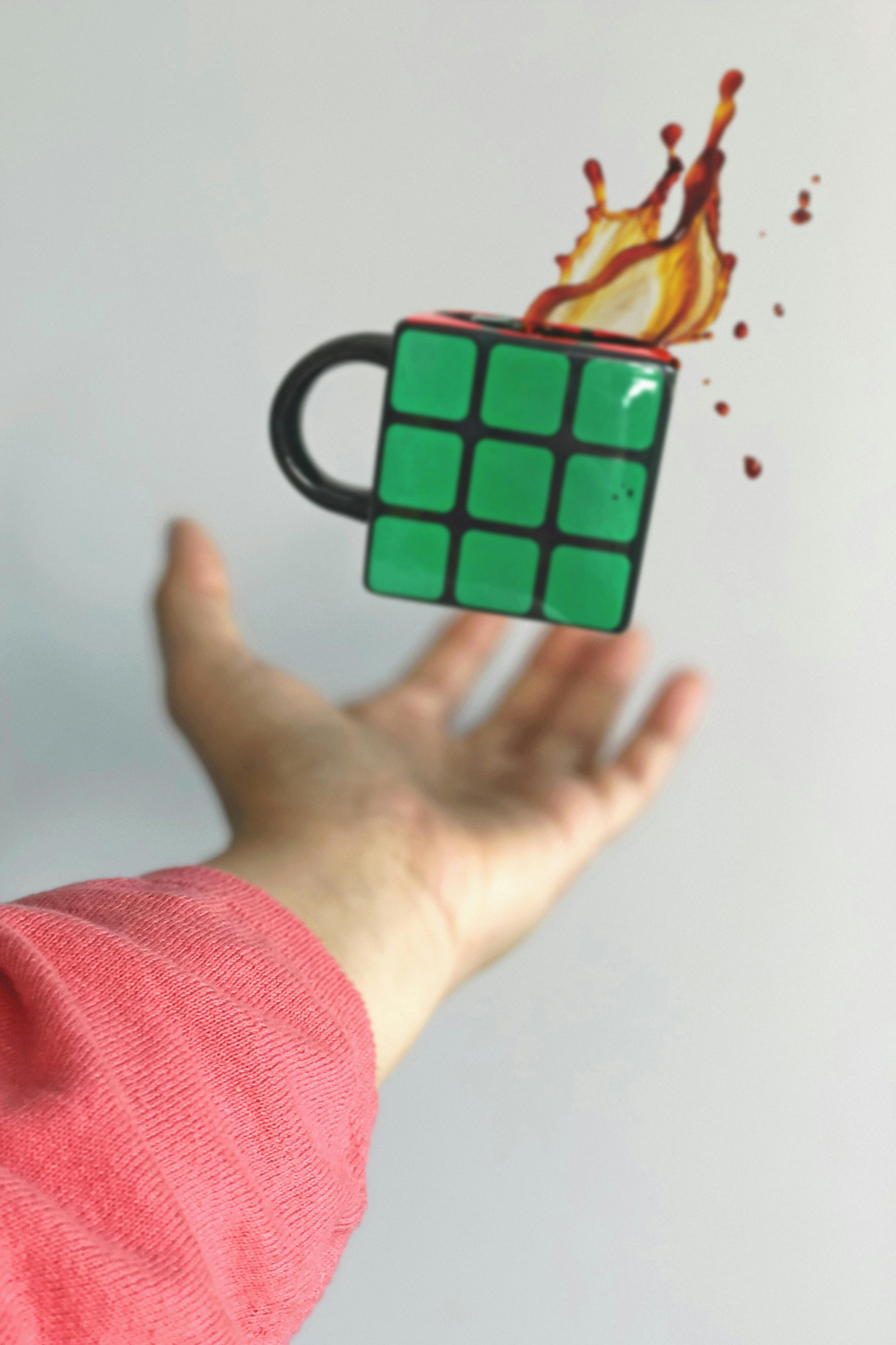
Coffee mug falling | Source: Pexels
My mother’s heart sank. She had worked so hard to make the room perfect, only to see her efforts so carelessly undone. But she knew she couldn’t afford to lose her job. It provided her with a sense of independence and stability for our family.
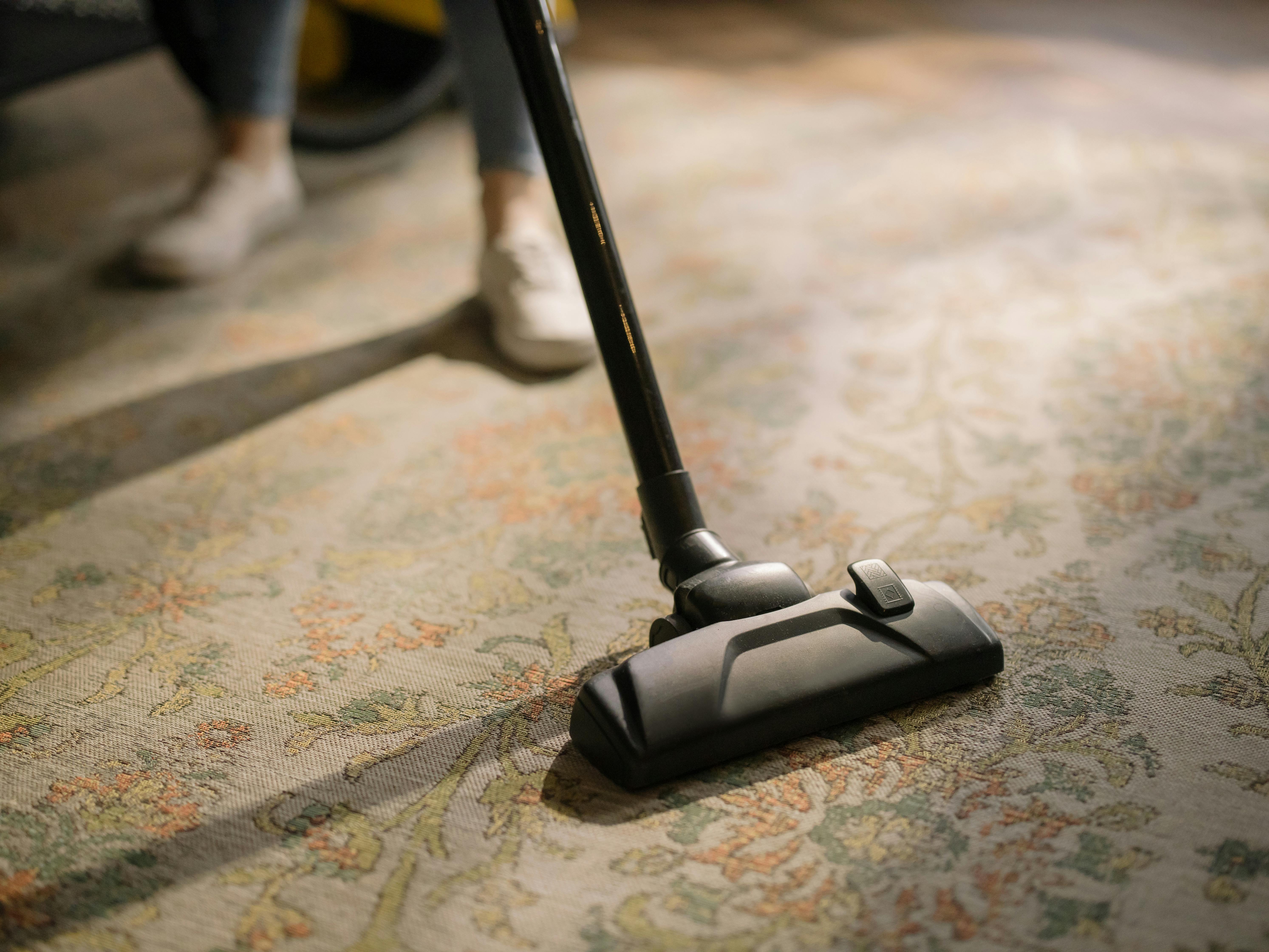
A person vacuuming a rug | Source: Pexels
Swallowing her pride, she silently cleaned the floor again, all while feeling Ms. Johnson’s piercing gaze on her. As she worked, the woman laughed. The mocking giggle echoed through the room. “Well done for a maid. You didn’t even talk back to me,” she taunted, her voice dripping with sarcasm. “Tomorrow, I’ll come up with something more interesting for you.”
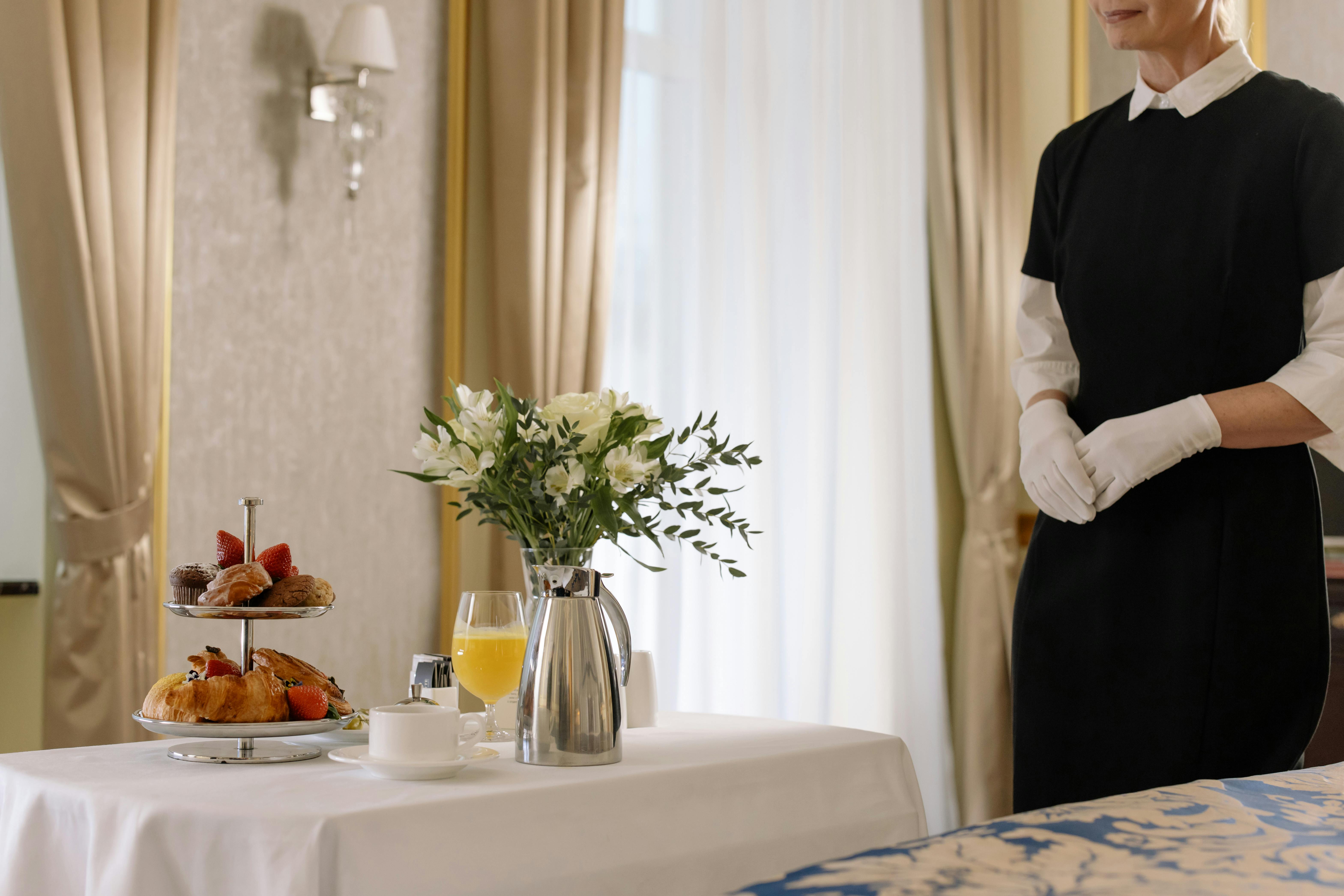
Woman standing near table with pastries | Source: Pexels
My mother finished her task, holding back tears. She knew showing any sign of distress would only give the woman more satisfaction. That night, as she recounted the story to me, I could see the hurt in her eyes. But there was also a spark of determination. She wasn’t going to let this entitled guest break her spirit.
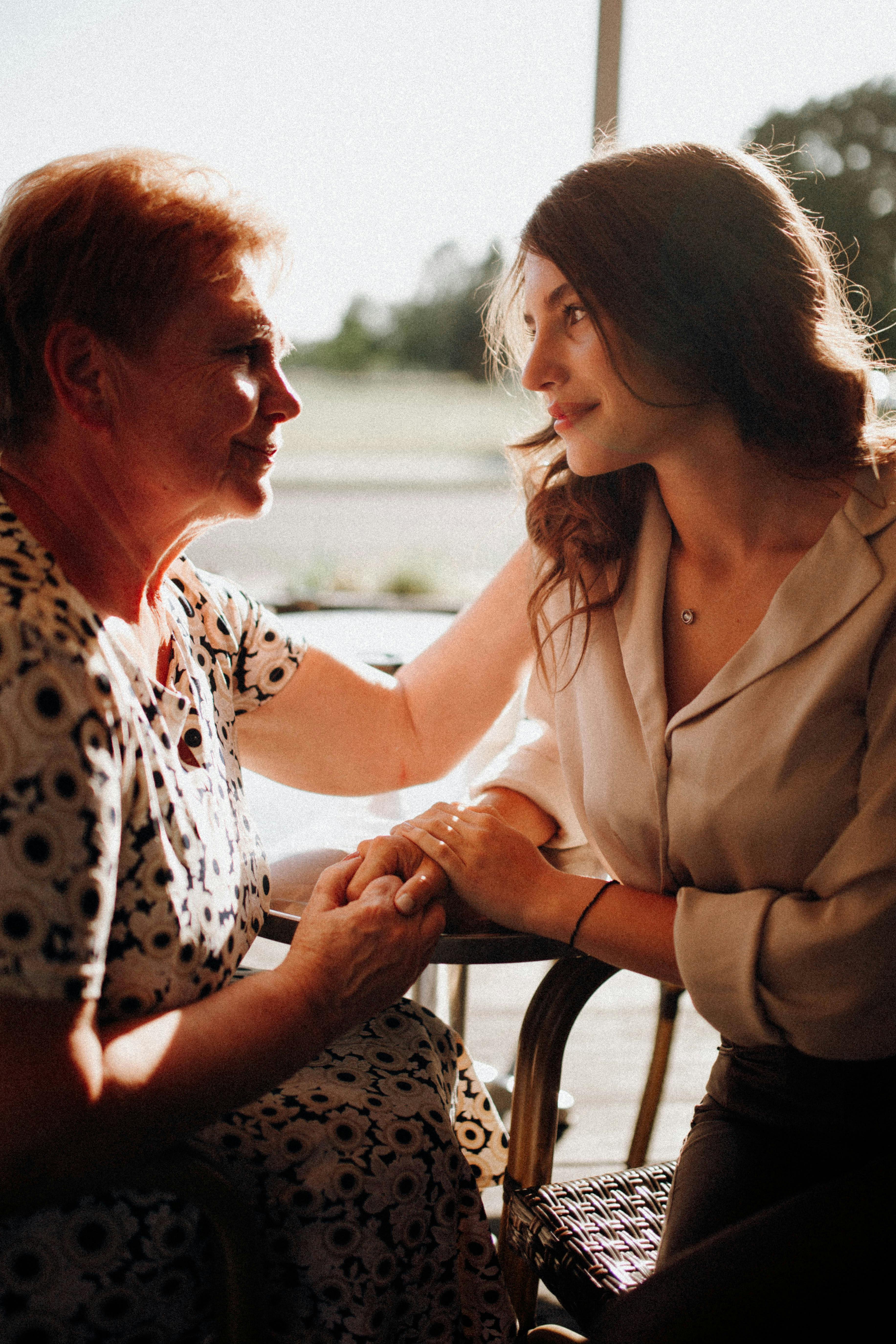
Mother and daughter sitting at the table holding hands | Source: Pexels
The next day, my mother went to work with a plan. She knew Ms. Johnson would try to humiliate her again, but this time, she was ready. She was determined to show this woman that kindness and respect were not weaknesses and that underestimating the resolve of someone who works with dignity and pride was a grave mistake.
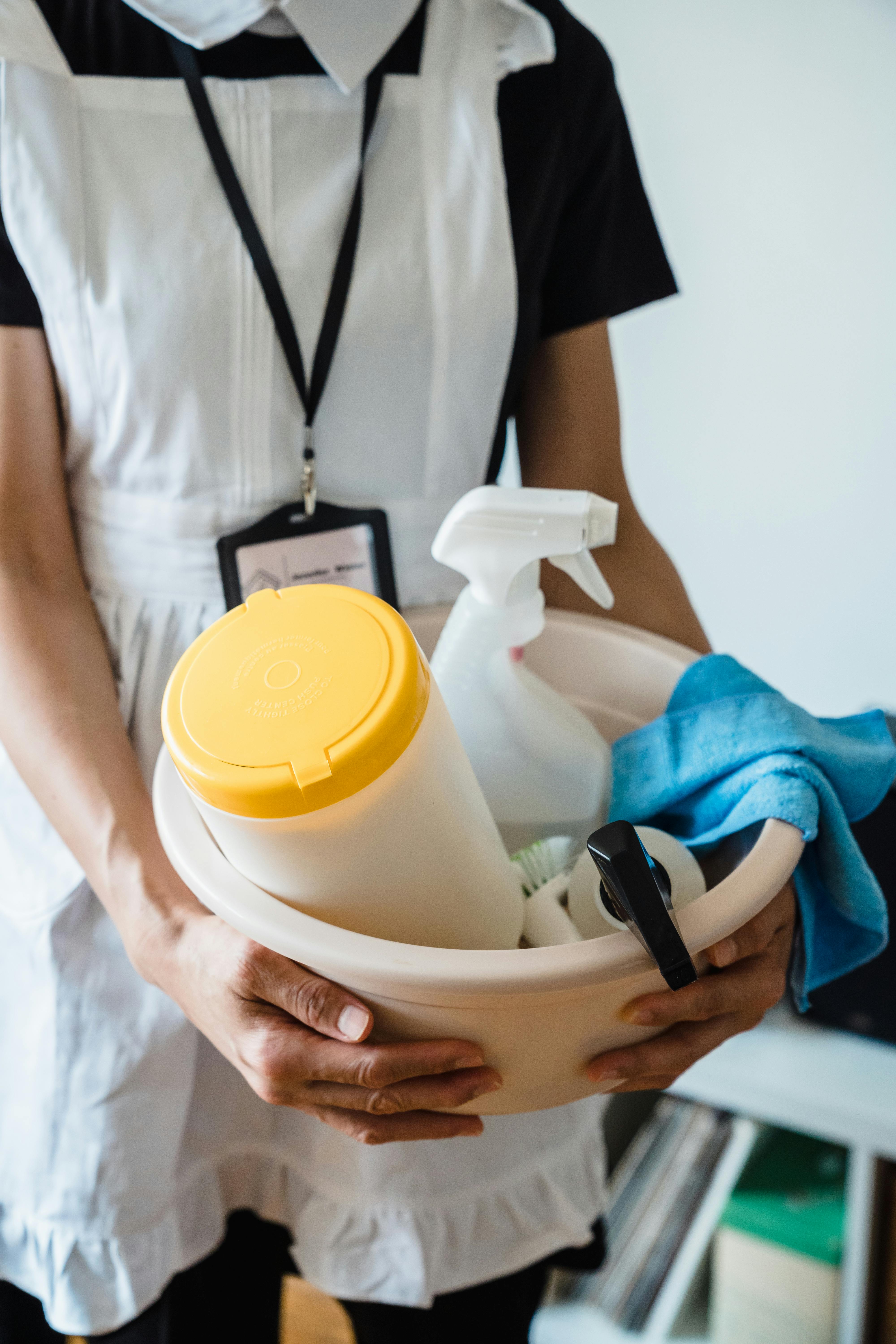
Woman holding a plastic basin with cleaning materials | Source: Pexels
Around mid-morning, my mother walked into room 256 with a steely determination. She had a plan. Sure enough, there she was, Ms. Johnson, reclining on the bed, her smirk already in place.
“Oh, look who’s back,” Ms. Johnson said, her voice dripping with disdain. “Let’s see what mess I can make for you today.” She reached for her coffee cup, a mischievous glint in her eyes.

Woman leaning on handrail in a hotel room | Source: Pexels
My mother kept her composure. She knew what to expect. Without a word, she began her cleaning routine, methodically and efficiently, refusing to rise to the bait. As she moved around the room, she noticed something important: Ms. Johnson’s laptop was left open on the table, the screen glowing with unattended work.
“Excuse me, ma’am,” my mother said in her most polite tone. “I need to dust the table. Would you mind closing your laptop?”

Person using phone with laptop on desk | Source: Pexels
Ms. Johnson huffed and rolled her eyes. “Fine,” she muttered, snapping the laptop shut and placing it to the side with an exaggerated sigh. “But hurry up. I have important work to do.”
“Of course, ma’am,” my mother replied, her voice steady.

Woman relaxing in a hotel room | Source: Pexels
“You’re slower than yesterday,” Ms. Johnson remarked, her voice dripping with sarcasm. “Do they not teach speed in maid school?” My mother ignored the jab, focusing on her task.
Ms. Johnson’s impatience was palpable, and she drummed her fingers on the bedside table. “Done yet?” Ms. Johnson snapped.
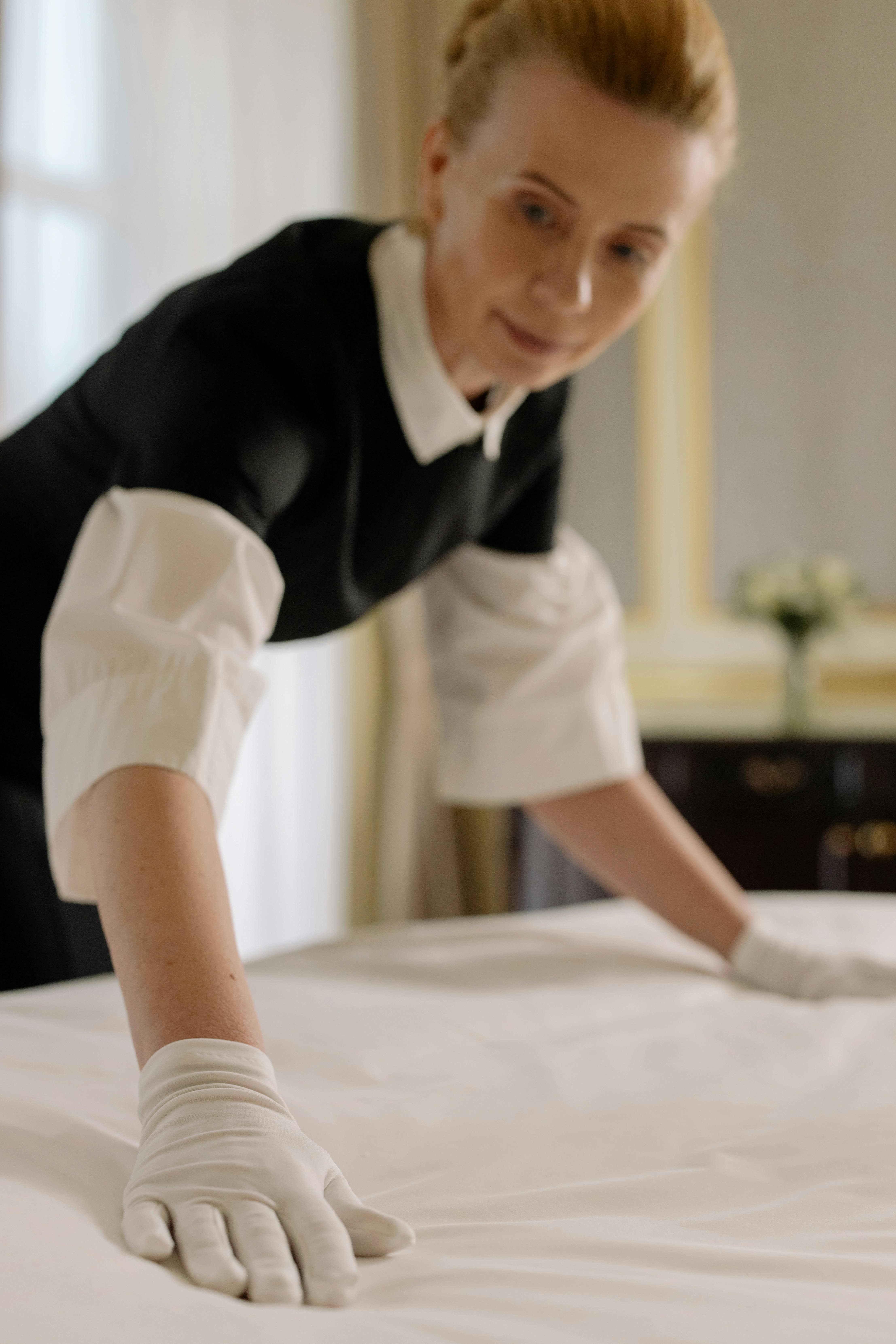
Woman tiding up a hotel room | Source: Pexels
“Almost, ma’am,” my mother replied calmly.
Just then, the door opened, and Mr. Ramirez, the hotel manager, appeared. He glanced around the room, his sharp eyes taking in the scene. “Good morning, Ms. Johnson,” he greeted her warmly.
“I trust everything is to your satisfaction?”
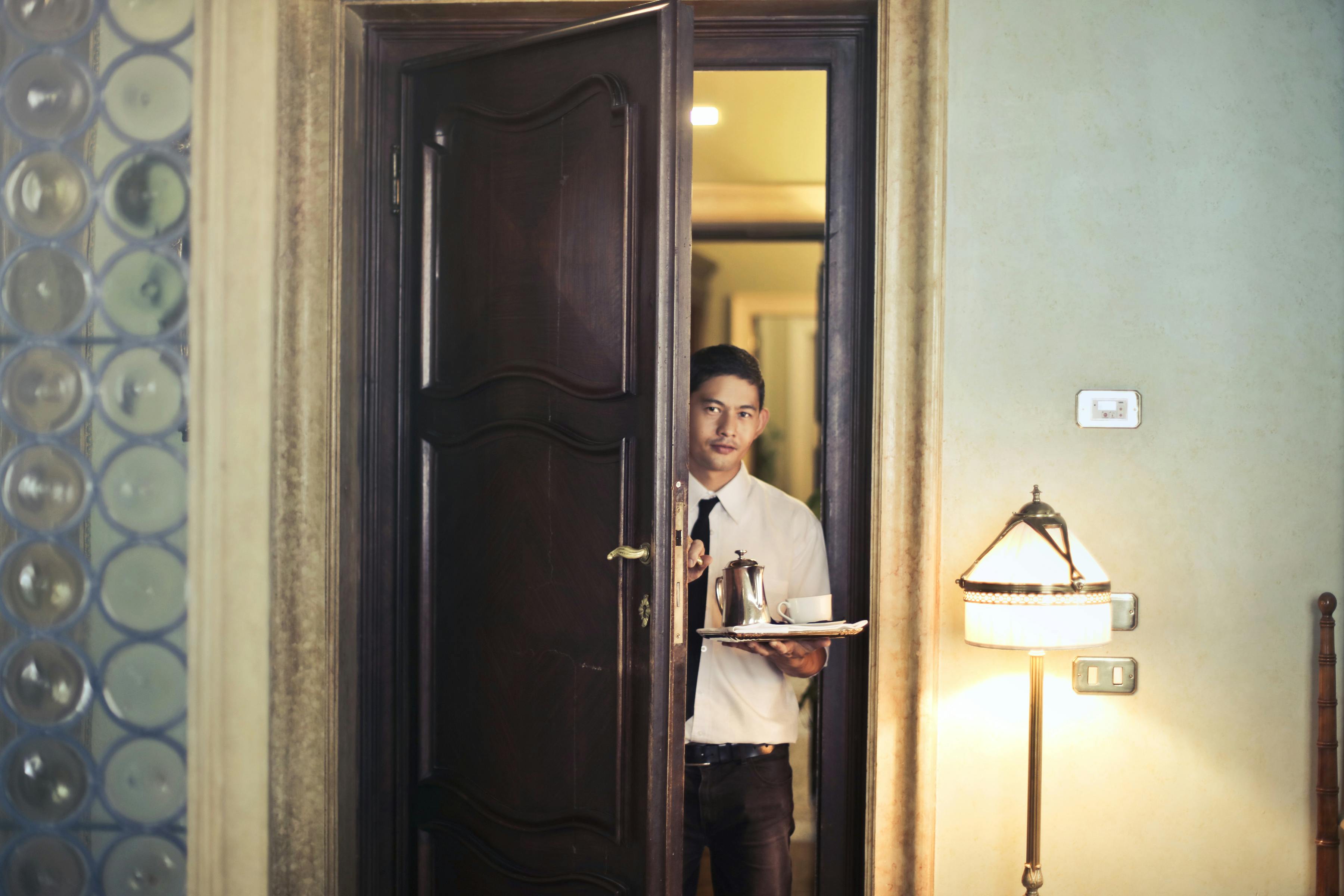
Hotel manager entering a room | Source: Pexels
Ms. Johnson scoffed. “It’s fine. Your maid here is just clumsy and slow.”
Mr. Ramirez frowned slightly. “I’m sorry to hear that. Our staff is trained to provide excellent service.”
“Well, maybe she needs more training,” Ms. Johnson said, casting a disdainful look at my mother.
Mr. Ramirez turned to my mother, concern evident in his eyes. “Mrs. Adams, is there a problem?”
My mother met his gaze with her calm and professional demeanor. “No, Mr. Ramirez. Everything is under control.”
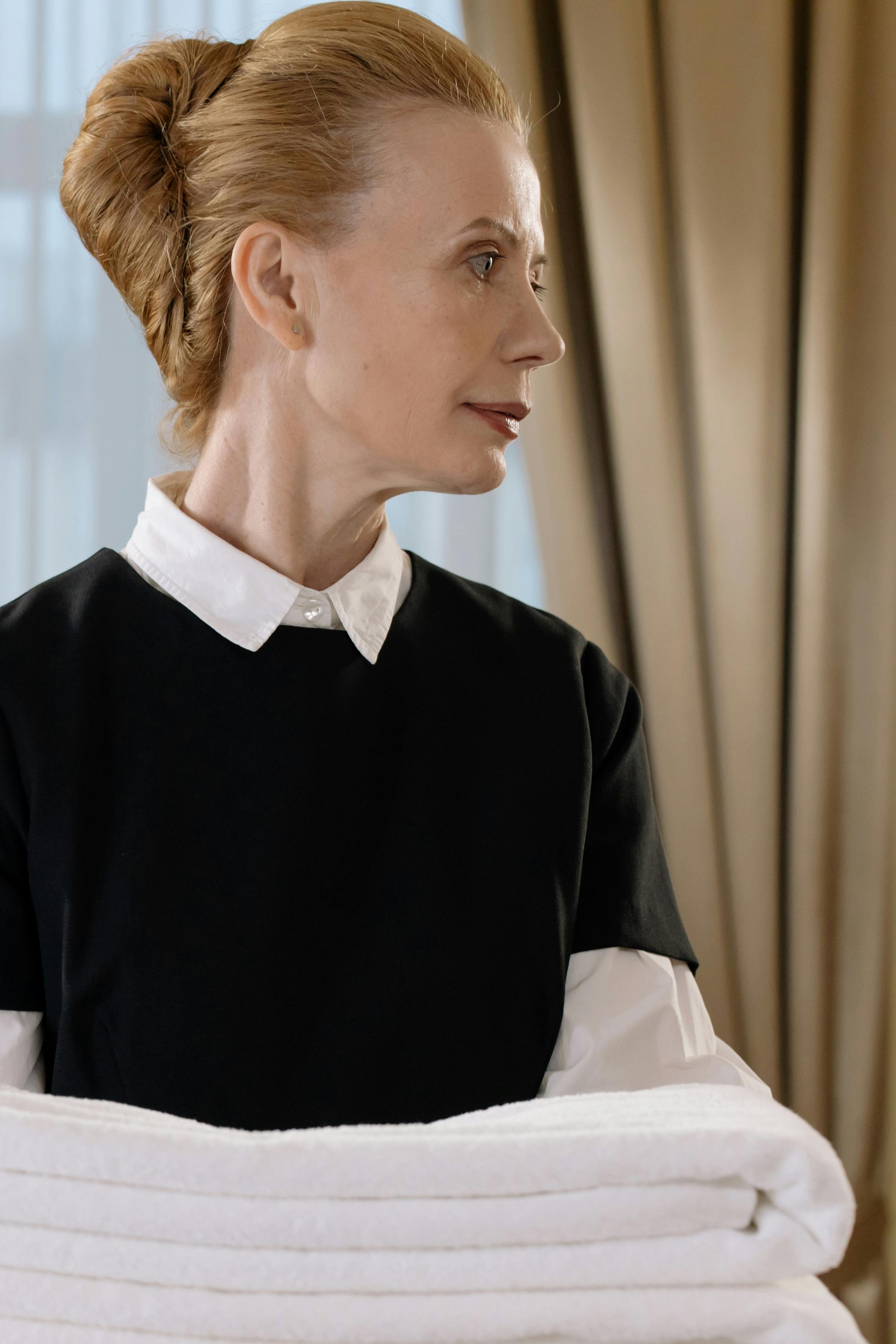
A chambermaid holding a stack of towels | Source: Pexels
Mr. Ramirez nodded, though his concern lingered. “Ms. Johnson, I assure you, we will make sure your stay is as comfortable as possible.”
Ms. Johnson waved dismissively. “Just make sure she doesn’t break anything.”
Mr. Ramirez gave my mother an encouraging smile before leaving. As the door closed behind him, my mother felt a surge of quiet confidence. She was ready for whatever Ms. Johnson had in store next.
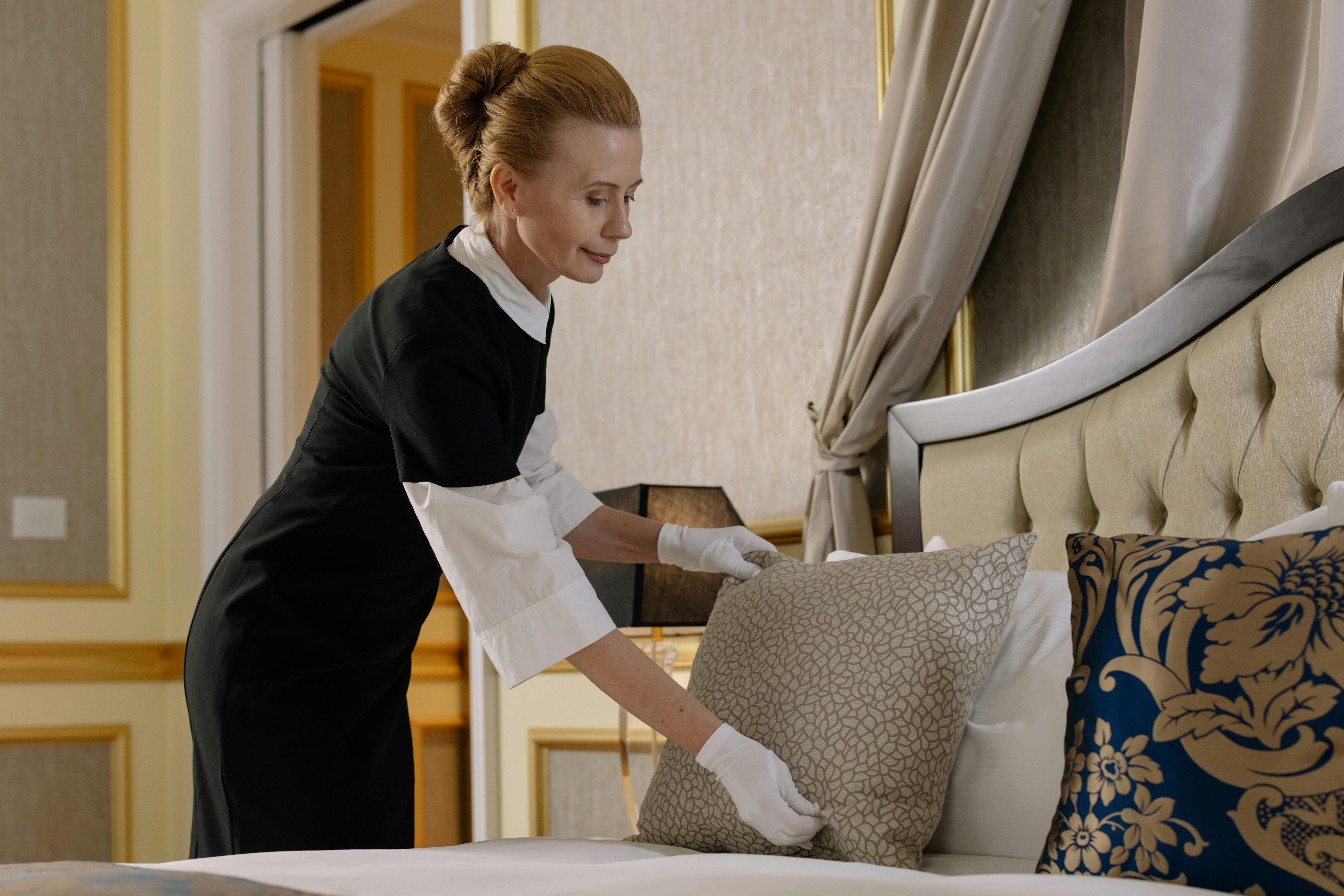
Woman fixing pillows on the bed | Source: Pexels
My mother continued her work, but she had one more trick up her sleeve. She knew Ms. Johnson would never learn unless she experienced a bit of discomfort herself.
As she finished cleaning, my mother subtly dropped a small, harmless but unpleasant-smelling packet under the bed. It was a trick she had learned from an old colleague, a mixture that would release a gradually intensifying odor over time. It wasn’t immediately noticeable, but within a few hours, it would become quite bothersome.
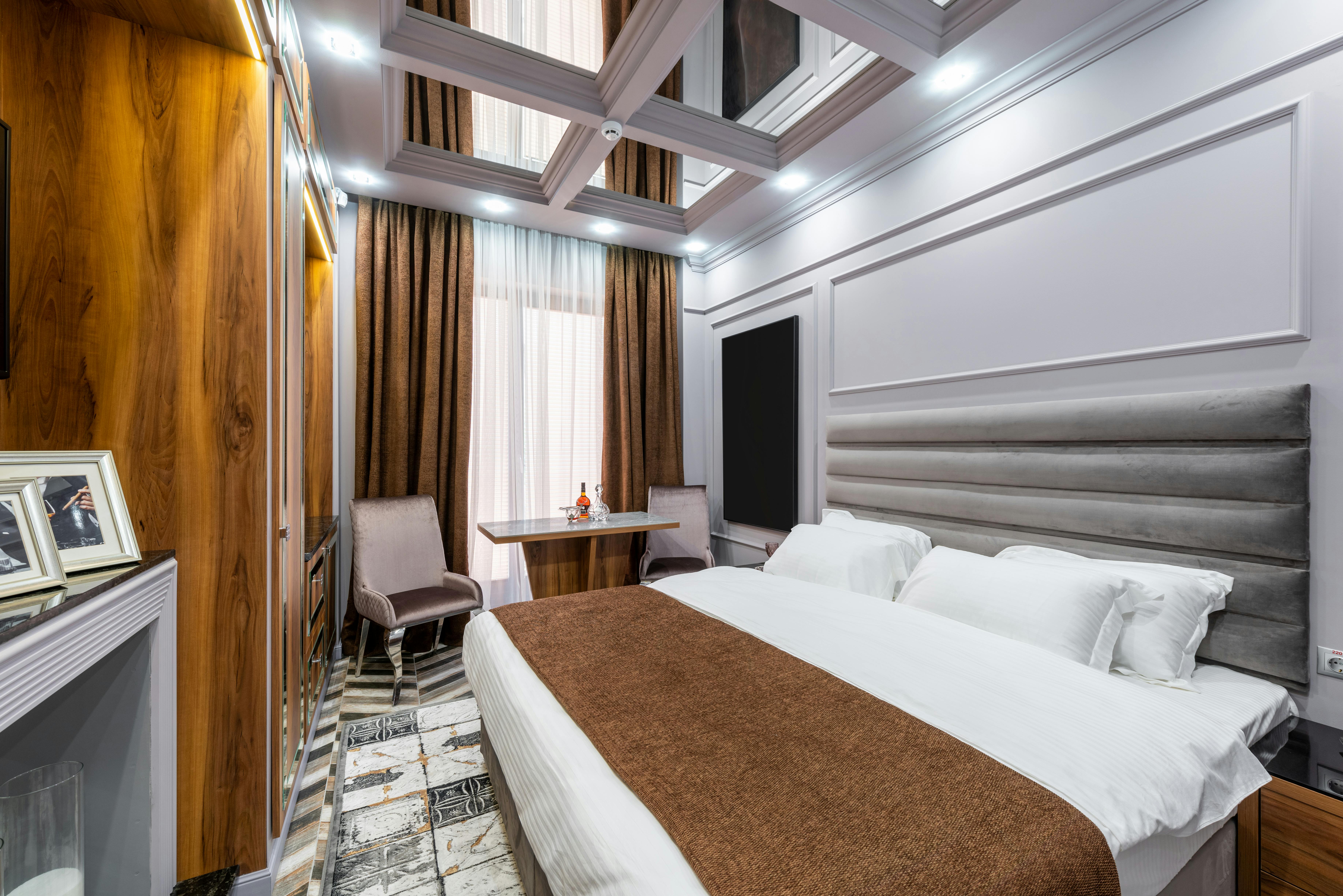
A tidy hotel room | Source: Pexels
“All done, ma’am,” my mother said standing up and gathering her cleaning supplies. “Have a pleasant day.”
The next morning, my mother arrived at work and was immediately greeted by the sight of Ms. Johnson in the lobby, furiously arguing with Mr. Ramirez. Her face was flushed with anger, and her voice carried through the lobby.
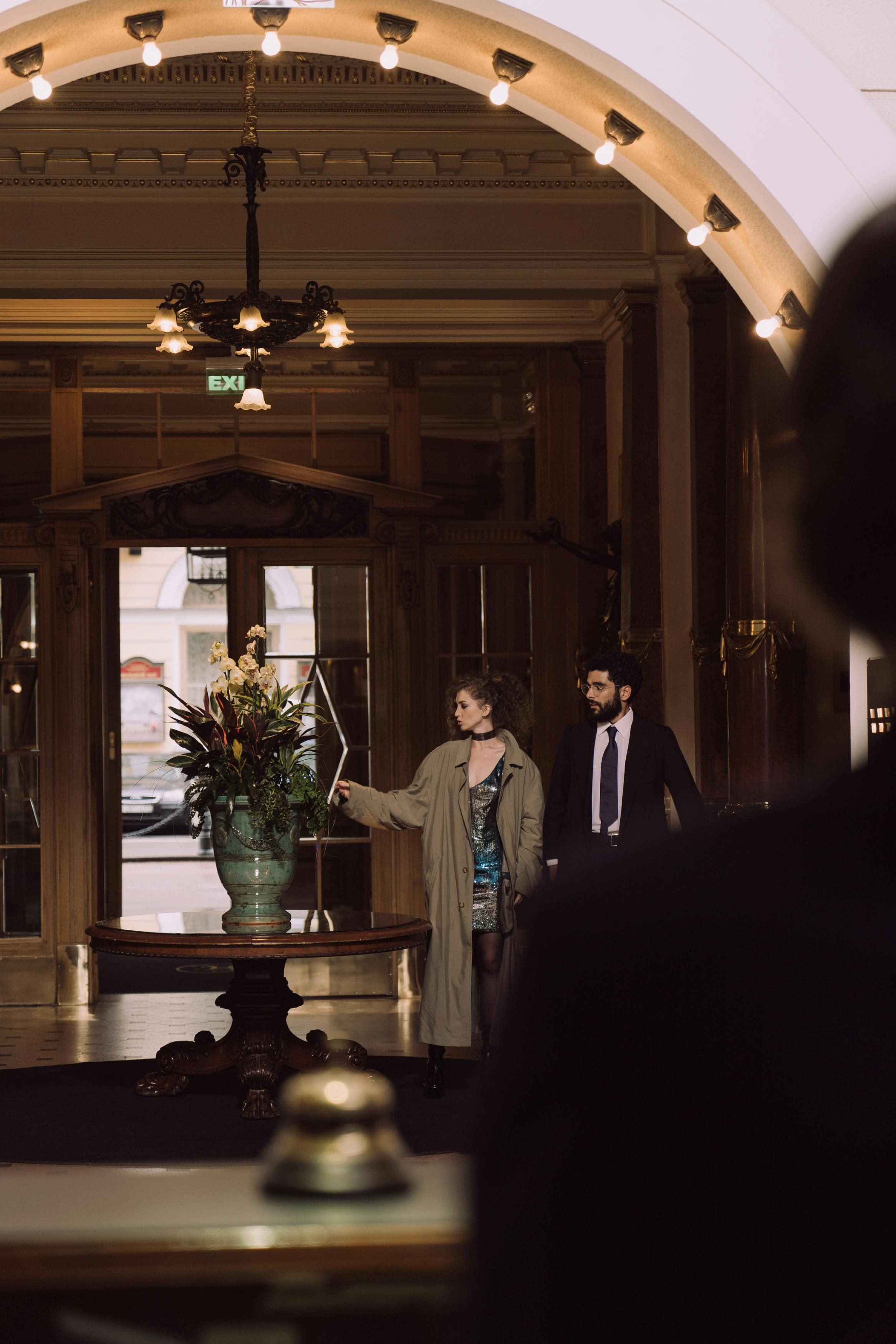
Man and woman standing in a hotel lobby | Source: Pexels’
“I can’t stay in that room! It smells awful! How can you expect guests to stay in such conditions?” Ms. Johnson was practically shouting, drawing the attention of other guests and staff members.
Mr. Ramirez, ever the professional, maintained his calm demeanor. “I’m very sorry to hear that, Ms. Johnson. We take such matters very seriously. We’ll investigate the cause of the smell immediately and move you to another room in the meantime.”
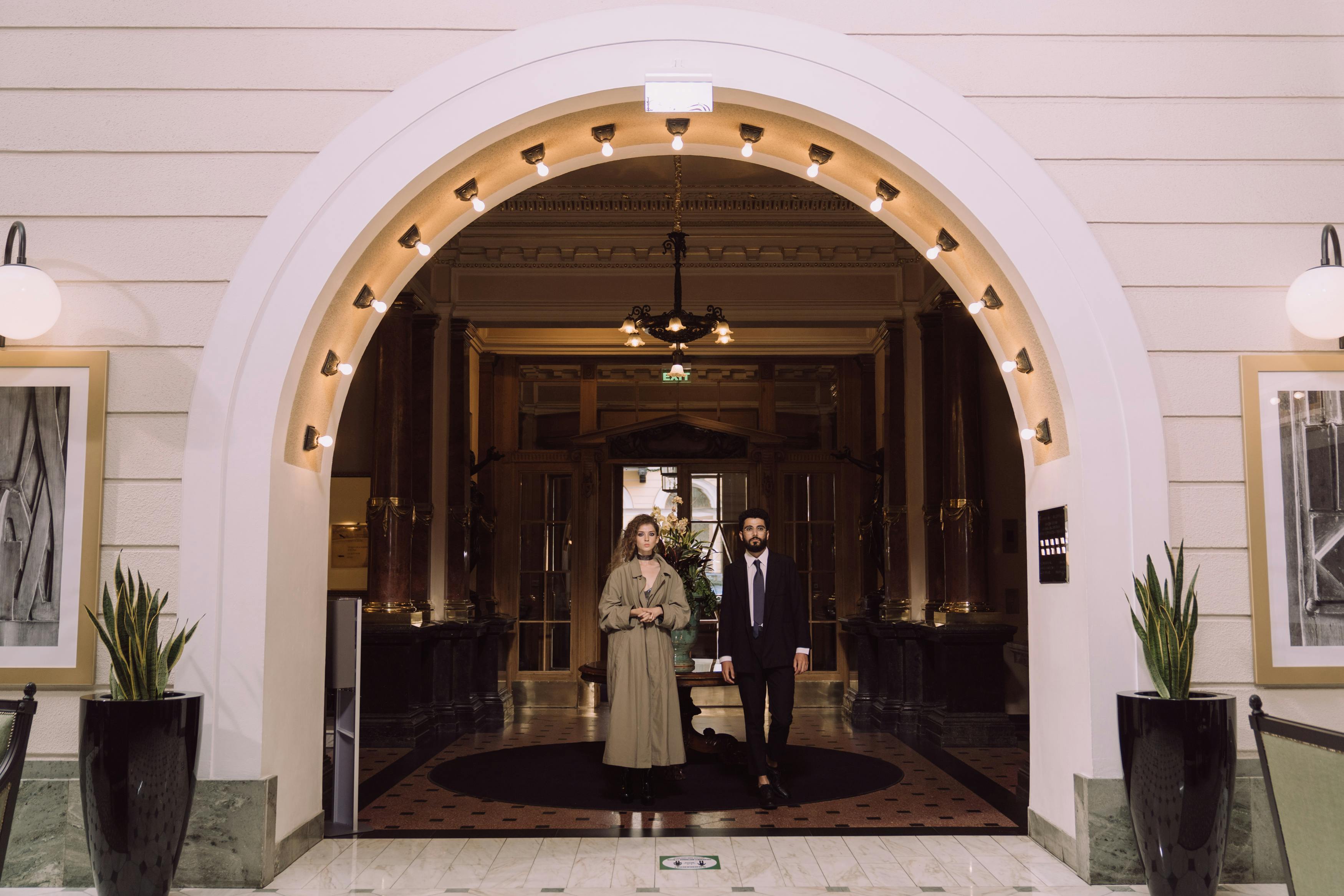
Two people standing at a hotel entrance | Source: Pexels
Ms. Johnson, still fuming, stormed off, her heels clicking sharply against the polished floor. Mr. Ramirez turned to my mother, who had been quietly watching the scene unfold.
“Mrs. Adams, could you please check Ms. Johnson’s room and see if you can find the source of the smell?” he asked, his voice calm but concerned. “Of course,” my mother replied, hiding a smile. She headed to room 256, her heart pounding with satisfaction.
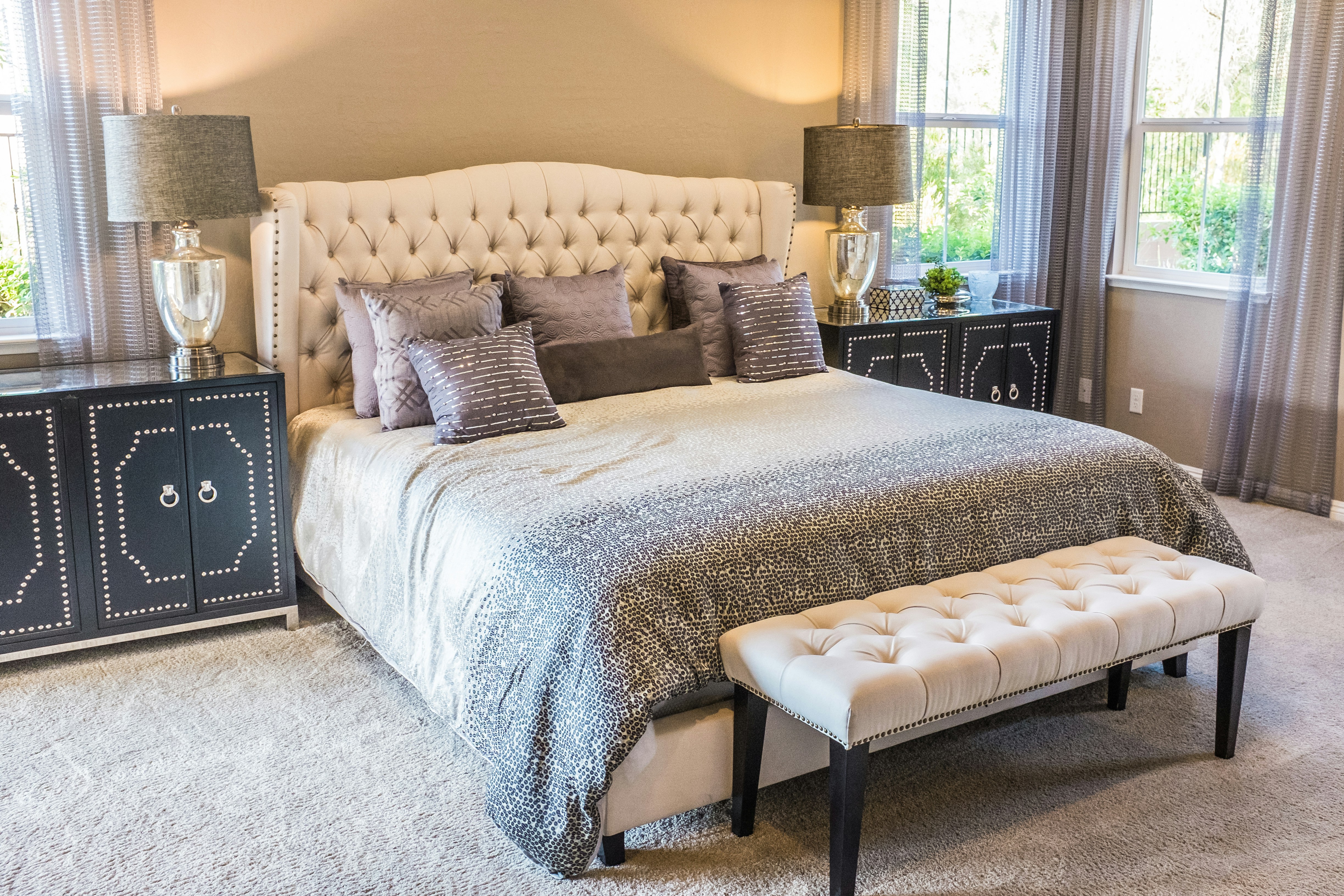
A clean hotel room | Source: Unsplash
Inside the room, my mother quickly found the packet she had placed under the bed and discreetly removed it. She then opened the windows and turned on the fan, allowing fresh air to circulate and clear the odor. As she worked, she couldn’t help but feel a small surge of triumph. Ms. Johnson had finally tasted a bit of her own medicine.
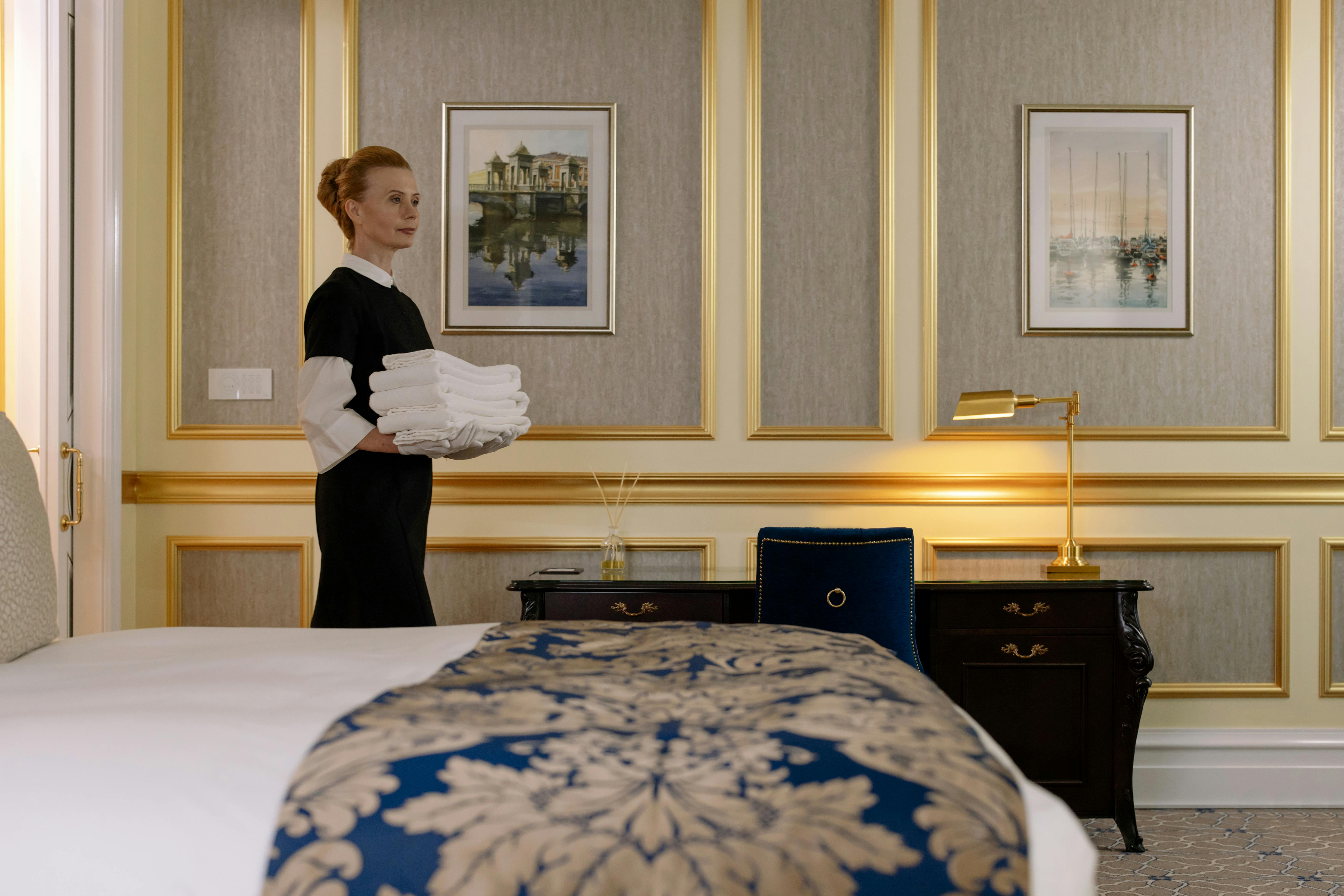
Woman carrying a stack of towers | Source: Pexels’
As she left the room, she ran into Mr. Ramirez in the hallway. “Did you find the source of the smell?” he asked.
“Yes, Mr. Ramirez,” my mother replied. “It seems something had been left under the bed. I’ve removed it and aired out the room. It should be fine now.”
“Thank you, Mrs. Adams,” Mr. Ramirez said, a hint of relief in his voice. “You’ve done an excellent job, as always.”
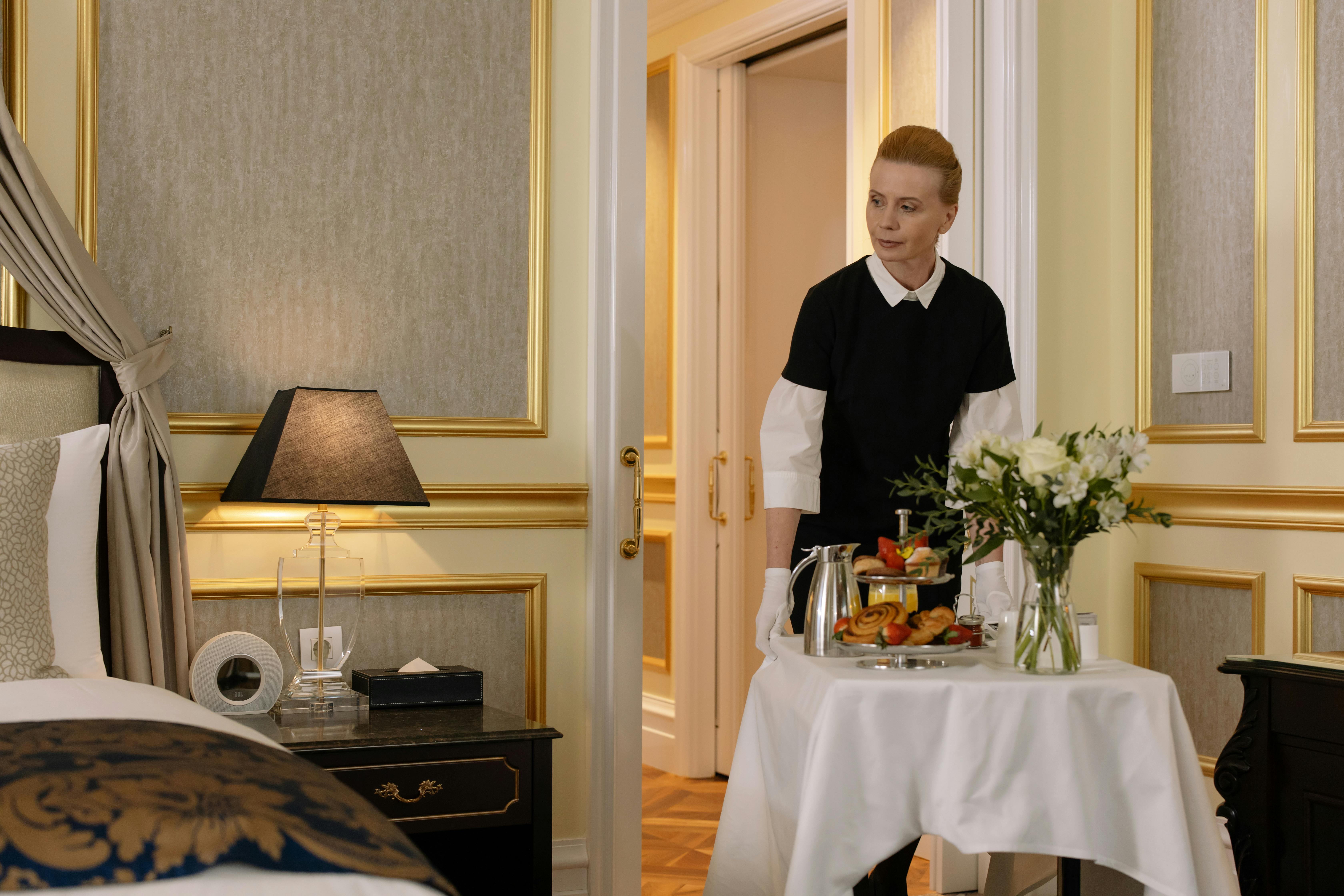
Hotel worker doing room service | Source: Pexels
My mother nodded and continued with her day, knowing that sometimes, justice is served in the smallest of actions. But that wasn’t enough. My mom had one more lesson to teach Ms. Johnson.
The next day, she was assigned to help move Ms. Johnson’s belongings to another room. As usual, Mom did her job efficiently, ensuring every item was carefully placed in the new room.
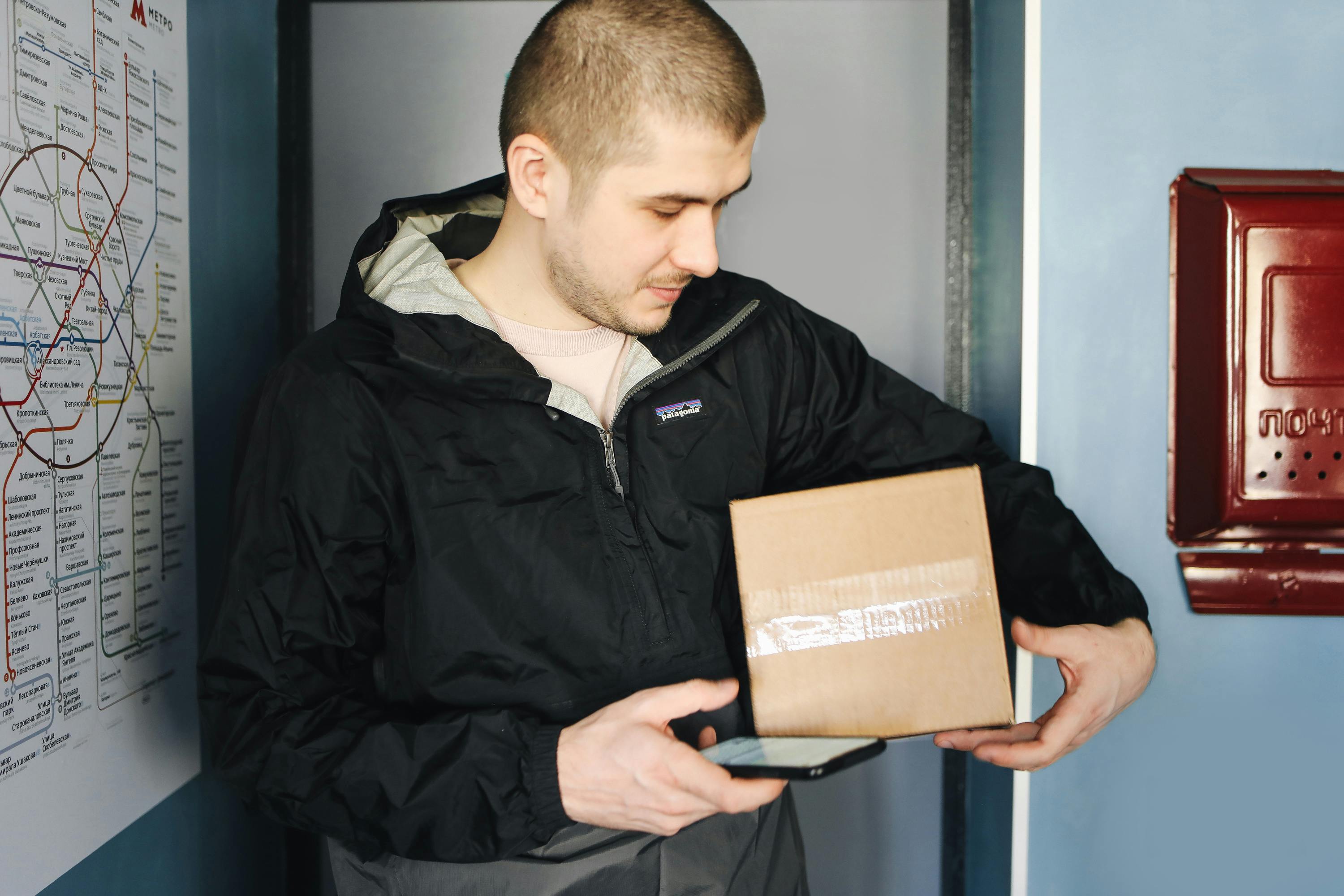
Delivery man holding a cardboard box | Source: Pexels
Later that afternoon, a courier arrived with a package for room 256; Ms. Johnson’s previous room. Aware that Ms. Johnson had moved to room 312, Mom saw this as her chance to deliver a delayed but impactful lesson.
“Excuse me, sir,” she said to the courier, stepping forward with a polite smile. “The guest in room 256 has been moved to room 312. You can leave the package at the front desk, and I will ensure it gets to her.” The courier nodded, handing over the package. “Thank you. I appreciate it,” he said, already turning to leave.

A person holding a package | Source: Pexels
My mother took the package to the front desk and, with a smile, placed it in the corner behind some other deliveries, making sure it would not be found immediately.
The next day, Ms. Johnson was in a frenzy. She was preparing for her flight and an important event later that evening. Suddenly, she realized something crucial was missing. She frantically called the front desk, her voice shaking with panic.

An angry woman in aa grey tank top | Source: Pexels
“I had a package delivered to room 256. Where is it? It has my plane tickets and my dress for tonight’s event!” Ms. Johnson’s voice was a mix of anger and desperation.
The front desk clerk, taken aback by her intensity, quickly checked the records. After some confusion and a hurried search, they found the package tucked away in the corner. The clerk immediately called my mother to deliver it to Ms. Johnson’s new room, 312.

Receptionist making a phone call | Source: Pexels
My mother, with a calm and measured pace, made her way to the room. She knocked on Ms. Johnson’s door, her expression serene. The woman yanked the door open, her eyes wide with anxiety. “Where have you been? I’ve been waiting for that package!” she snapped.
“Here is your package, ma’am. It was delivered to the wrong room,” my mother said sweetly, holding out the package.
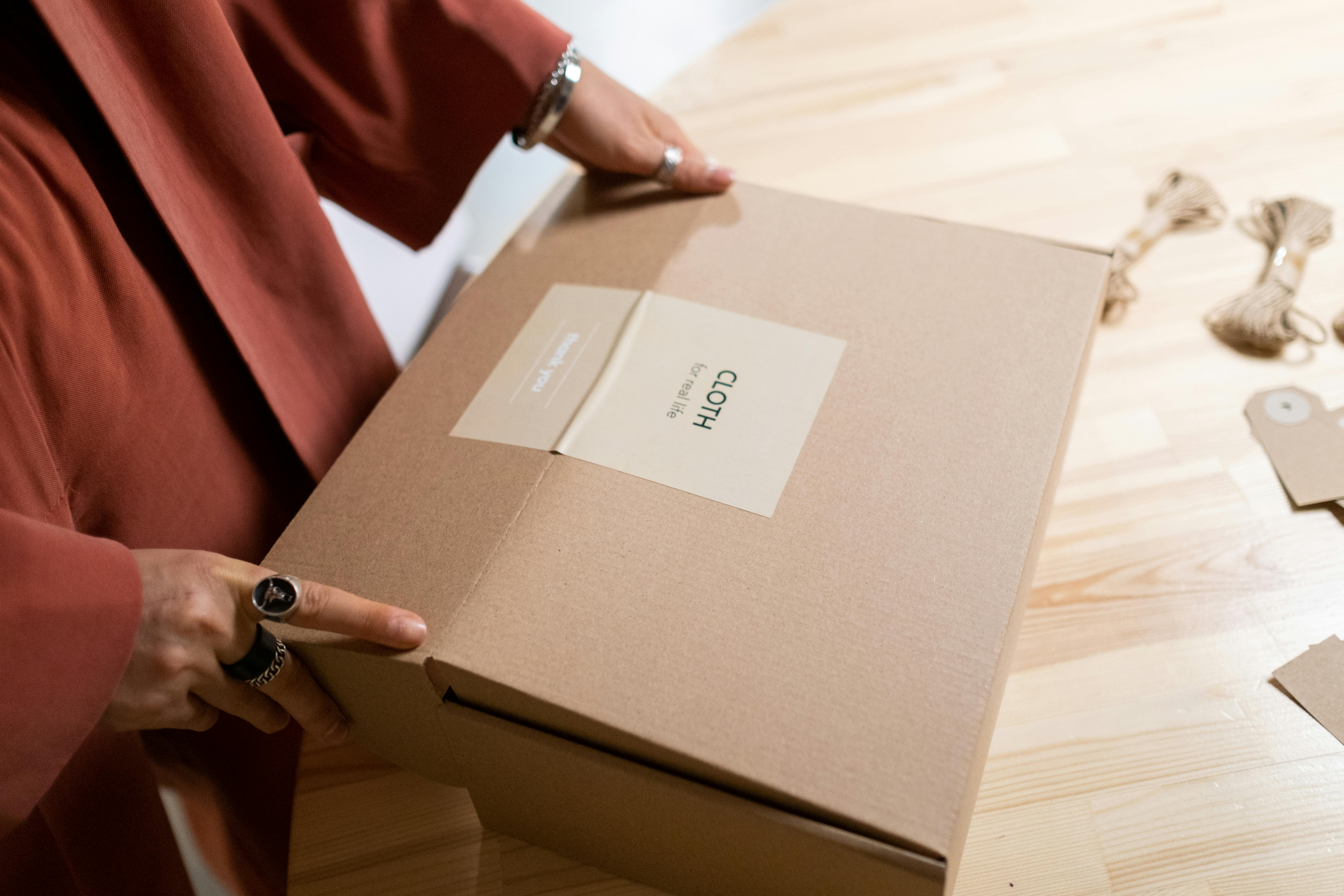
A person holding a brown box | Source: Pexels
Ms. Johnson snatched the package from her hands and ripped it open. Her face fell as she realized the delay had cost her dearly. The tickets were now useless, and she had no time to prepare for her event. Frustration and defeat were etched into her features. She could only muster a weak, “Thanks,” before slamming the door in my mother’s face.
Mom walked away, a slight smile playing on her lips. She knew she had given Ms. Johnson a taste of her own medicine, all without stepping outside the bounds of her duties. It was a quiet victory, but a deeply satisfying one.
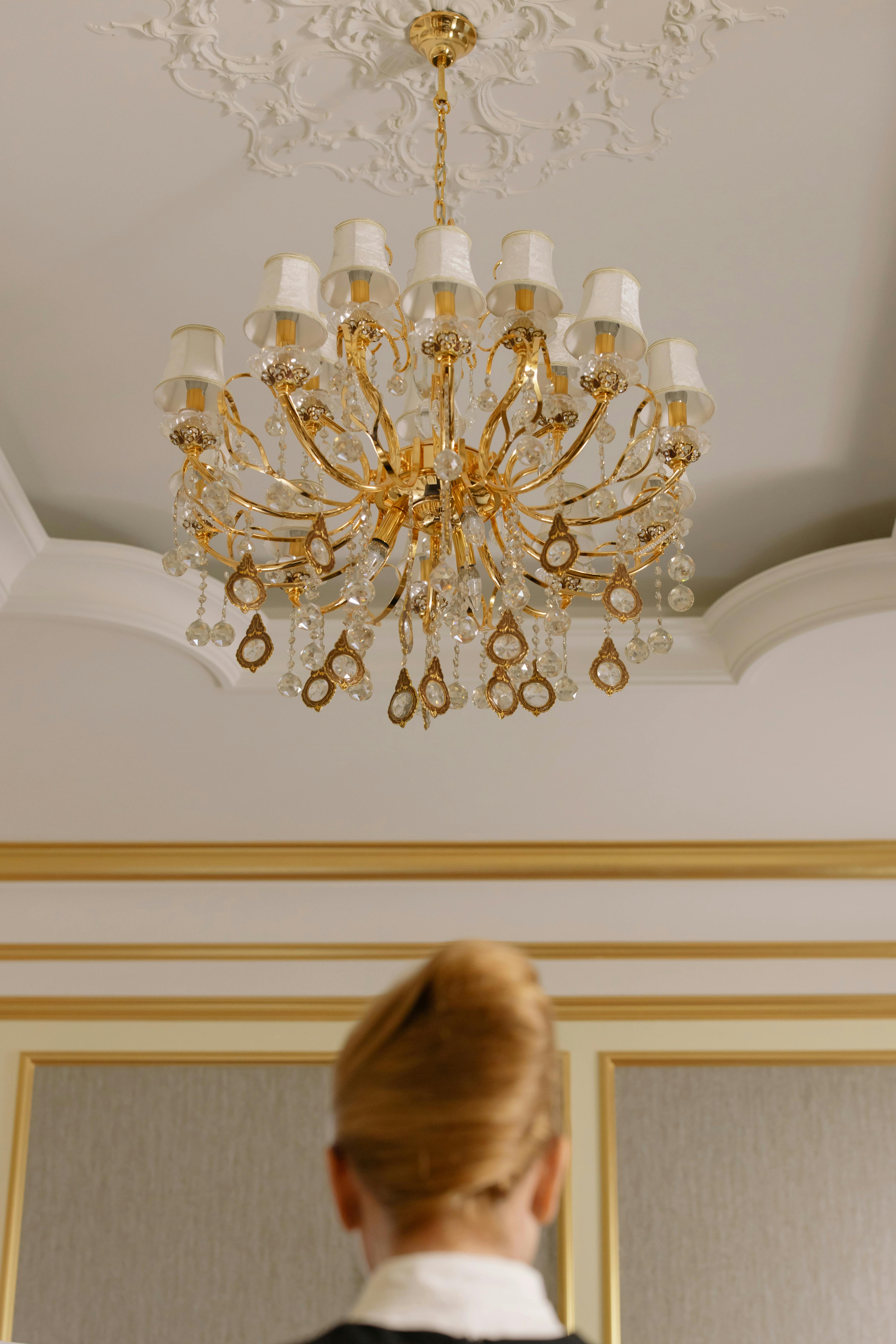
Woman standing under a chandelier of a hotel room | Source: Pexels
When my mother told me about the incident later, I could see the relief in her eyes. “Sometimes,” she said, her voice soft but firm, “the best revenge is simply letting people experience the consequences of their own actions.”



Leave a Reply